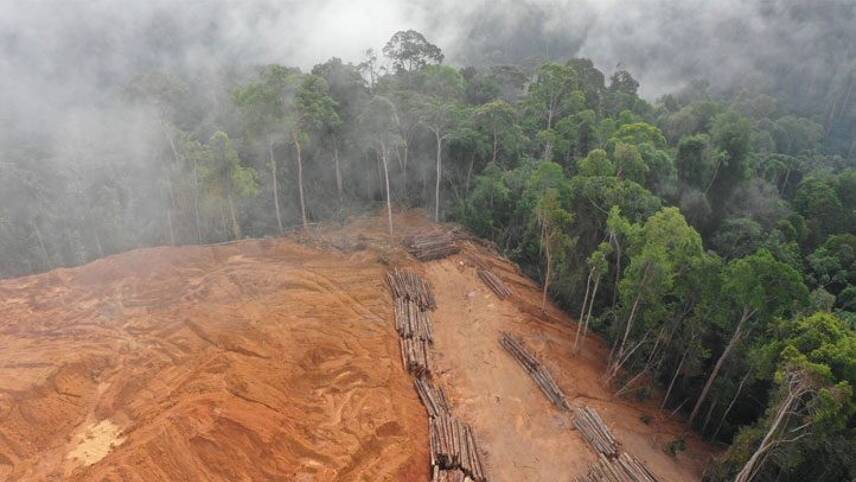Register for free and continue reading
Join our growing army of changemakers and get unlimited access to our premium content

According to the RSPB and WWF
The MPs are also calling for stricter measures to stop UK-based financial firms from investing in corporations and other organisations with proven links to deforestation. Some of the world’s largest banks have been linked to industries that are causing mass deforestation and biodiversity loss, with some in the finance sector estimated to be providing loans and underwriting worth more than $2.6trn to climate-wrecking initiatives.
The calls to action are being made by the Environmental Audit Committee (EAC) in a new report concerning the UK’s impact on biodiversity globally. Published today (30 September), the report commends the UK for its commitment to protect 30% of habitats domestically, but warns that the nation must take full responsibility for its global biodiversity footprint if its plans for tackling the climate and nature crises are to be deemed credible.
The report’s overarching recommendation is that the Government develops a legally binding environmental footprint target, with time-bound, numerical targets to reduce its total material consumption and biodiversity impact on a global scale.
Think tank Green Alliance has been urging the Government to consider pledging to halve resource consumption by 2050, given that the UK uses natural resources at more than twice the rate considered sustainable. Similarly, the Fairtrade Foundation has stated that some 46% of the UK’s consumption-related emissions are generated overseas.
The EAC has also put forward several recommendations which could likely be enacted before this overarching target is finalised. It is joining NGOs including Global Witness and WWF, and big businesses including Nestle and Nando’s, in calling for the Environment Bill’s measures for eliminating deforestation in multinational supply chains to be strengthened.
Currently, the Bill is designed to ban UK-based business from importing from suppliers that deforest overseas. All large, UK-based businesses will need to prove that the ‘forest risk’ commodities they source internationally come from deforestation-free suppliers – or explain why they are unable to do so. Defra classes soy, palm oil, cocoa, beef, leather, rubber and forest products like wood and paper as ‘forest risk’ commodities.
The caveats are that only deforestation deemed illegal in the country of origin is covered, and that the requirement will not apply to the financial sector. The EAC flags the fact that, in consultations on the Bill, 90% of respondents were in favour of stronger and extended measures to tackle deforestation. Moreover, Forestry Minister Lord Goldsmith has stated himself that only 50% of deforestation happening globally each year is classed as illegal.
“To increase the sustainable use of forest-risk commodities we recommend that the Government make it illegal for UK businesses and the finance sector to use commodities linked to deforestation and, at the very least, include the finance sector within the scope of the provisions on forest-risk commodities in the Environment Bill,” the EAC report states.
Additionally detailed in the report are calls for the Government to ensure that all forest-risk commodities it procures are certified as sustainable by the end of the year and calls for sustainability impact assessments to be conducted for all future trade agreements.
Many NGOs and the Government’s own Trade and Agriculture Commission have recommended that core environmental standards are developed for all trade deals. In the absence of these standards, or a requirement for sustainability impact assessments, the UK has made or considered deals which have been broadly criticised across the green economy, including the recent agreement with Australia.
“We have a unique opportunity with new trade agreements to incorporate iron-clad standards for the environment, among other issues, which should be urgently addressed,” EAC chairman Philip Dunne MP summarised.
Biodiversity COP15
The report comes ahead of the official opening of the UN’s Convention on Biological Diversity, which will take place online from 11-15 October. That event will include High-Level Segment discussions that will aim to produce a “Kunming Declaration” on a global biodiversity agreement. The Declaration will be ratified after in-person negotiations, which have been pushed back to spring 2022 due to Covid-19.
A draft version of the Declaration has already been published by the UN. The overarching aim is to protect at least 30% of terrestrial and marine habitats by 2030, by which point biodiversity loss will need to be halted.
Nations have collectively failed to deliver the UN’s pre-2020 Aichi Targets on biodiversity.
“Our Committee’s findings are clear: we must bring consumption to a sustainable level or the wildlife, animals and nature we hold dear are threatened,” Dunne said.
“While this issue is bigger than any one person’s habits, if we all take action to tackle unsustainable consumption, we can make a lasting impact to halt biodiversity loss.
“This Government can really show leadership on these issues ahead of COP26 and the biodiversity COP next year: I hope it steps up to the challenge.”
Sarah George


Please login or Register to leave a comment.